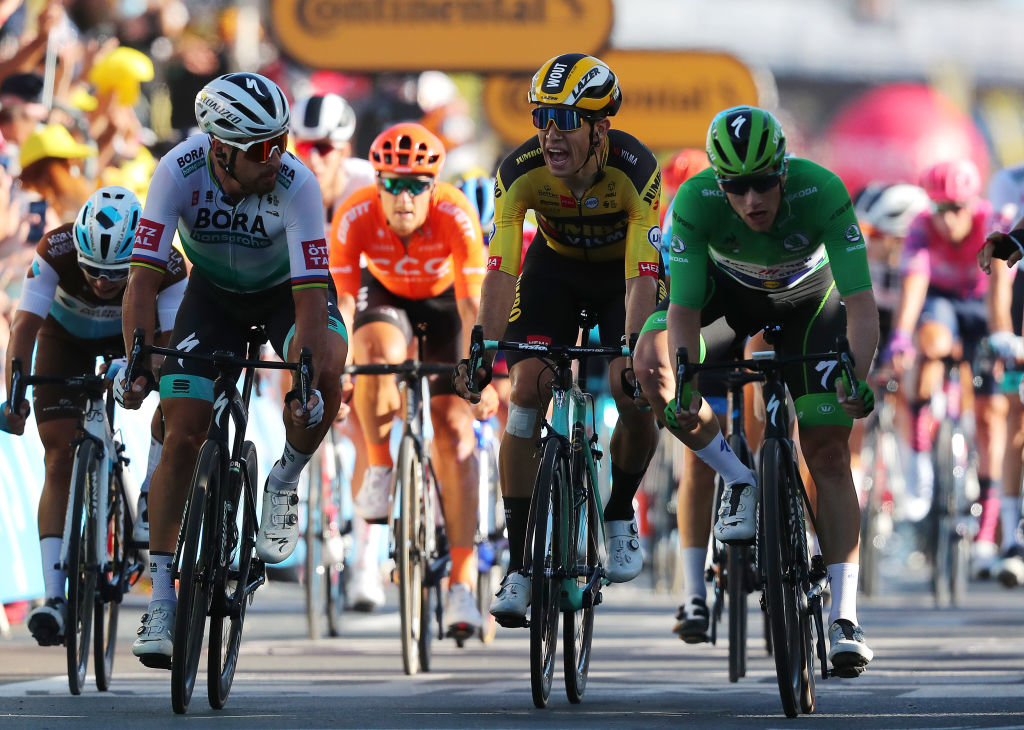Wout Van Aert 'surprised and shocked' by Peter Sagan shoulder barge in Tour de France sprint
Yellow jersey Roglic backs decision to relegate Slovakian

Wout van Aert and Tour de France leader Primož Roglič (Jumbo-Visma) have backed the commissaires' decision to relegate Peter Sagan (Bora-Hansgrohe) from second place on stage 11 after the former world champion’s manoeuvre in the bunch sprint in Poitiers.
Sagan bumped Van Aert with his shoulder en route to placing second on the stage behind Caleb Ewan (Lotto Soudal) – and, crucially, ahead of green jersey Sam Bennett (Deceuninck-QuickStep) – but on reviewing the footage, the race jury relegated him to the back of the bunch and 85th place on the stage.
Sagan was not ejected from the Tour completely, as he was at Vittel in 2017, when he was deemed to have caused the crash that forced Mark Cavendish out of the race with a fractured shoulder blade.
His move on Wednesday, however, led to a relegation that will prove costly to his hopes of winning an eighth green jersey in Paris. It also provoked the ire of both Van Aert, who responded with a clear non-verbal comment after the stage, and Roglič, who said that the decision to relegate Sagan was the right one.
“I just saw the sprint and I think it’s the right decision [to relegate Sagan],” Roglič told reporters in a mini-press conference on Wednesday after the stage. “The sprinters are quite different to the rest of us, they are really crazy guys, fighting for those places and fighting for the sprint, but it still needs to be fair. It’s the right decision.”
Van Aert’s anger was understandable, given that Jumbo-Visma had given him the green light to go for a third stage win – unlike on the Île de Ré 24 hours previously, where he was fully on team worker duty.
Asked when Van Aert had received permission to have a go in the sprint, Roglič said: “We always say in the team meeting before the race that we will see how the stage goes and in the end, we decided he could do it. He didn’t just do a great sprint, in the final he was great helping me get through that narrow last part [with 7km to go – ed.] and in the last part.”
Get The Leadout Newsletter
The latest race content, interviews, features, reviews and expert buying guides, direct to your inbox!
However, Sagan’s move did nothing to help Van Aert chances of landing a hat-trick of stage wins after his triumphs in Privas and Lavaur in the opening week. Instead, he had to settle for third.
“I think it’s not done [right] to do it like that, actually,” Van Aert told reporters afterwards. “In my opinion, I sprinted in a completely straight line, I started complete on the right on the barriers, and he just tried to create space for himself, and for me, he's not allowed to do that. I think it’s already dangerous enough.
“I was really surprised and shocked at the moment I felt something. I was making a maximum effort, so I was really scared.”
As for whether he could have placed higher on the stage without Sagan’s interference, Van Aert he said: “Higher? Of course, but I don’t know if it was enough to win. The only opportunity I had was when there was some space on the right and that’s why I went a bit too early. It would never have been perfect but to end like this – it’s frustrating.”
Van Aert said that when he crossed the line that he was in dismay. “[I was] so shocked and angry I didn’t use a very nice word," he said regarding his discussion with Sagan after the stage. "Afterwards I tried to say to him that it [a sprint] isn’t done like that and I didn’t like what he was doing. The only thing that came back was strong words, so it was hard to have a conversation.”
Van Aert was dismissive of suggestions that Sagan’s bike handling skills are such that he perhaps believes he can go through spaces in the peloton that aren’t there. “That’s a weird way of thinking, there wasn’t a gap,” Van Aert said. “And if you use your elbows to create one, that’s completely against the rules. It’s not reasonable, and it’s not done.”
Alasdair Fotheringham has been reporting on cycling since 1991. He has covered every Tour de France since 1992 bar one, as well as numerous other bike races of all shapes and sizes, ranging from the Olympic Games in 2008 to the now sadly defunct Subida a Urkiola hill climb in Spain. As well as working for Cyclingnews, he has also written for The Independent, The Guardian, ProCycling, The Express and Reuters.
